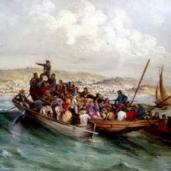This Day in History: April 9, 1820
Additional Date: April 9, 1820
The first British Settlers, known as 1820 Settlers arrived in Algoa Bay, (now Port Elizabeth) on board of twenty-one ships, the first being the Chapman. They numbered about 4500 and included artisans, tradesmen, ministers of religion, merchants, teachers, bookbinders, blacksmiths, discharged sailors and soldiers, professional men and farmers. They were placed on the eastern border of the Cape Colony, later called British Kaffraria, to strengthen the border against incursions by hostile Xhosa societies. Their first homes, tents given to them by the government, were pitched after they had chosen a suitable piece of land. Their first and primary task was to build more permanent abodes for their families, after which they started to till the lands.
The government wanted to keep them as farmers, though many of them did not have farming experience. They were also too few in number and poorly equipped to repel invaders and soon the drift towards towns started, where these settlers made their mark on South African society. They embarked on development programmes by setting up a free press, schools, churches, and businesses. Those who had stayed on the farms eventually began to prosper.
